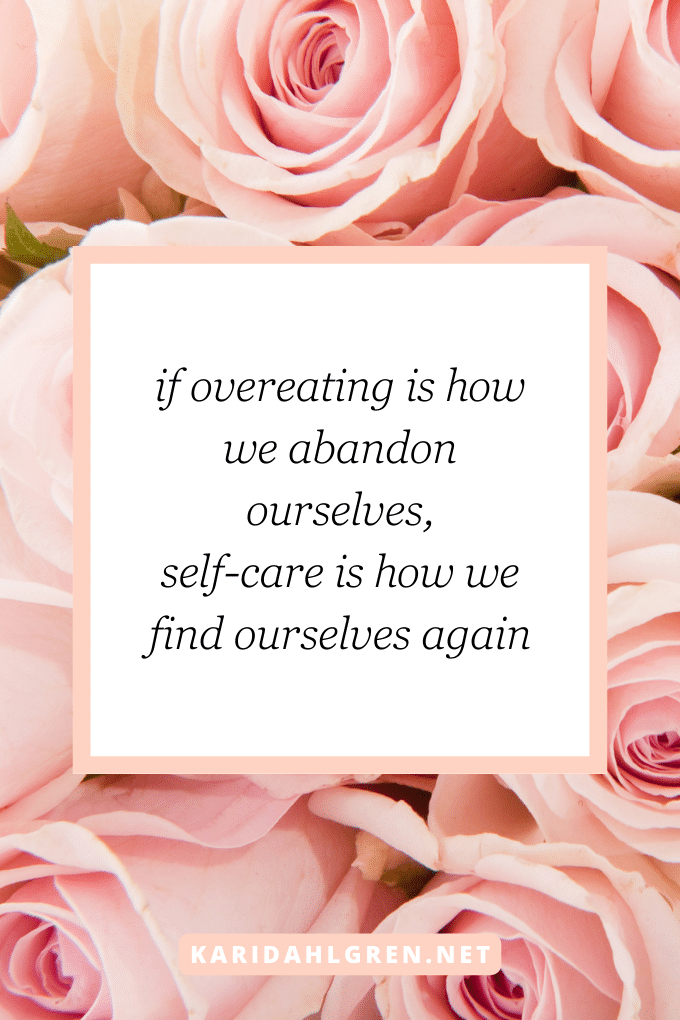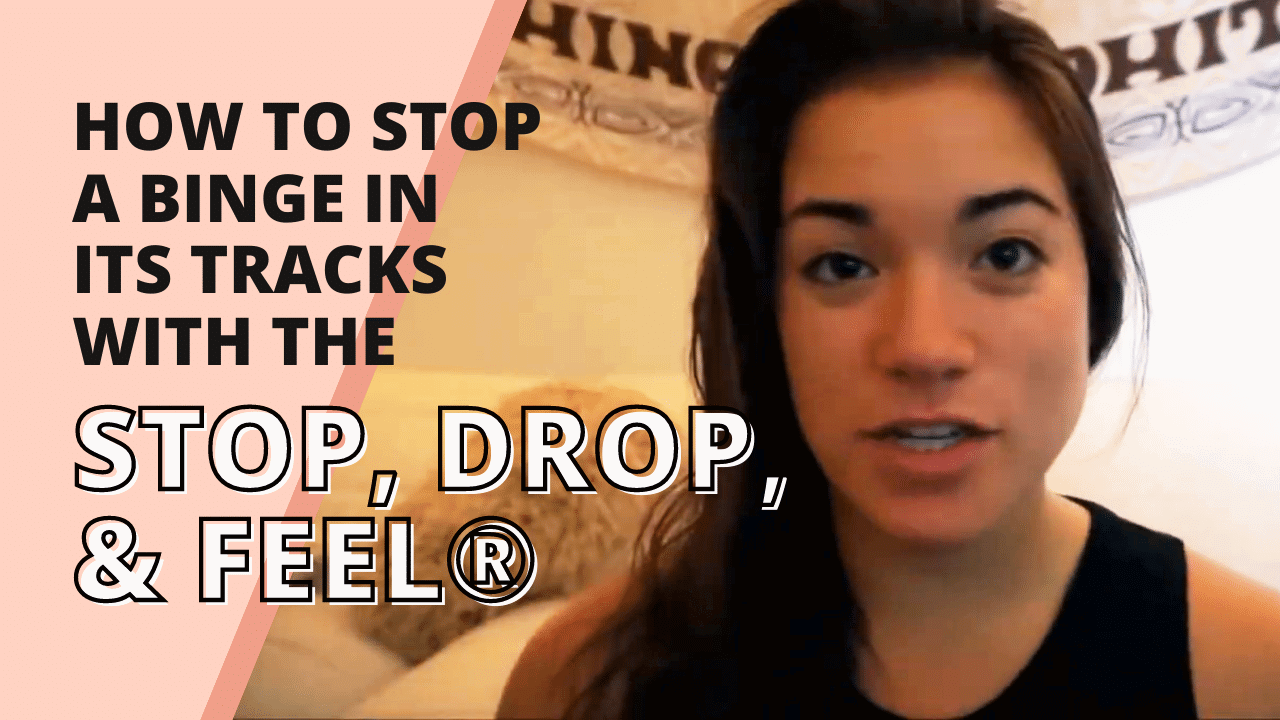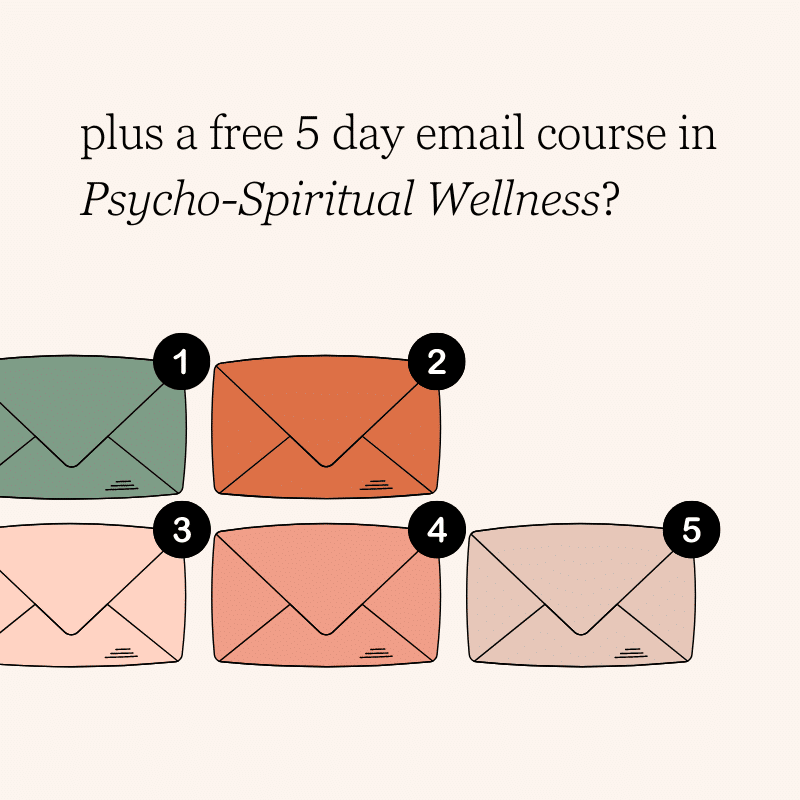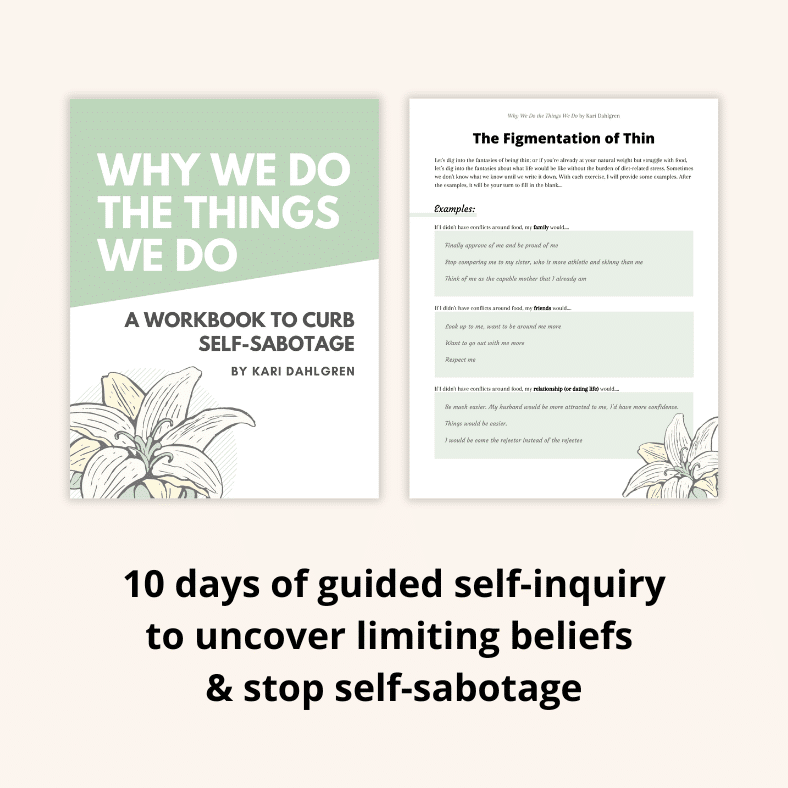
Overeating isn’t a problem – it’s a symptom. Like all symptoms, it’s best to address the root problem in order to find a lasting solution.
The idea that I’m about to present may sound radically unconventional when compared to the typical advice out there (after all, the name of my program is Psycho-Spiritual Wellness — it doesn’t get any more atypical than that). And in this case, unconventional just might work.
Here’s my radical idea: Overeating is caused by self-abandonment.
There seems to be an intricate connection between overeating and the inability to stay with ourselves. Hopefully, by shining some light in this area, we can evolve in ways we never imagined.
How We Abandon Ourselves with Food
Why would we abandon ourselves in the first place?
In my humble opinion, self-abandonment happens because life is full of sharp edges, and food helps take the edge off. For example, when we feel anxious or stressed, food helps calm the nerves. At least, it does initially! Because many of us later feel anxious and stressed about the fact that we’ve overeaten, and the vicious cycle never stops.
While food offers an excellent coping mechanism (truly!) it can become problematic when we repeatedly reach for food when we aren’t hungry. This often looks and feels like self-sabotage.
For example, let’s say that you’re someone that struggles with loneliness. While the activities of your day might keep the loneliness at bay, it often becomes heightened at night, when we’re alone in bed.
Without knowing it, we feel pulled towards the kitchen. Somehow, someway, we end up standing in front of the fridge, grazing on foods we don't even care for.
On one hand, this is self-sabotage! And on the other hand, we need to pay extra attention to how much we’re actually eating — not to ensure we aren’t eating too much, but to make sure we’re eating enough!
I can’t tell you how many of my clients are eating too little — all while feeling like they’re eating too much! If all you have to eat in a day is an egg sandwich for breakfast and then chicken and broccoli for dinner, then binge eating at night isn’t really overeating — it’s just eating!
Tangent aside, what if you have truly eaten enough in a day? What if your doctor or friendly neighborhood nutritionist would smile and agree that you have adequately fueled yourself for the day, and you still struggle with night eating?
This is what I’m talking about when I say that overeating is how we abandon ourselves. We reach for food to numb the pain instead of sitting with the loneliness — or whatever your least favorite emotion is — and letting ourselves feel that feeling.
Returning to Center
If the root cause of overeating is self-abandonment, then the solution is to come back to ourselves over and over again. The best way to do this is to take care of yourself.
By taking care of yourself, you bring the attention inward and return to yourself. While this also brings attention to unwanted emotions sometimes, it’s important to feel these feelings. This is what my method to stop binge eating — called the “Stop, Drop, & Feel” — is all about.

I’ve found that when we make space for uncomfortable feelings (like anxiety, loneliness, stress) it takes the edge off the compulsive desire to overeat. It works by helping you to develop emotional tolerance, or your ability to be uncomfortable without getting swept away by it.
When we have emotional tolerance, we are more equipped to handle life's sharp edges when they come around, making us far less likely to reach for food to take the edge off.
I’ve also found that it can be powerful to couple the Stop, Drop, & Feel with self-care. Perhaps it’s because self-care can feel indulgent — and that’s a great alternative to indulging in food when you’re not hungry.
If you’re someone that puts others before yourself a lot, you probably don’t indulge in self-care too often, and food might become the indulgence whether we like it or not (it’s called hedonic eating). This is why it’s so important to find ways of coping without food.
Also, note that I keep saying “when you’re not hungry.” This is important! It’s important to allow yourself to eat the foods you want to eat when you’re hungry — even if it’s indulgent. This is how we overcome binge eating long-term. Permission to Eat is another critical aspect of eating psychology.
Self-Care Is the Antidote, But It Won’t Always Feel Good
Also, please don’t confuse my recommendation of self-care as an absolute must. Just like I don’t agree that we always need to eat without distraction (see: my partial tear-down of mindful eating) I also don’t agree that we always need to choose self-care when we want to overeat.
If you have the time and space for it, by all means, have at it!! Take the bubble bath. Read the book. Go for the walk. Turn on the television. But if you’re too stretched for time or if you simply don’t want to sit with yourself for that long (especially for things like bubble baths) you don’t have to.
Although self-care is great BECAUSE it encourages us to pay attention to ourselves, this can be a tall order for those of us that struggle with compulsive eating; because compulsive eating is often a subconscious attempt to escape our feelings, and self-care makes it a little more difficult to do so.
So, to summarize everything with a cute little bullet point list:
- Compulsive eating is often a subconscious attempt to abandon ourselves because there’s a feeling that we don’t want to feel
- Instead of turning to food, we can turn to self-care, which is the opposite of self-abandonment
- However, if you simply don’t have the space for self-care, just try to do the Stop, Drop, & Feel at least once and you’re on your way to building an evergreen skill that helps stop compulsive eating long-term
Choosing to Pay Attention
Since the desire to eat when you’re not hungry is about escapism and abandonment, it’s a powerful move to turn inward when you’re feeling compelled to eat when you aren’t hungry. Whether that “turning inward” involves self-care of the Stop, Drop, & Feel — well, that’s up to you to decide on a moment-by-moment basis.


![best seller [cover of Why We Do the Things We Do]](https://karidahlgren-net.b-cdn.net/wp-content/uploads/2023/09/why-we-do-the-things-we-do-1.png)

WOW what an incredible article! So happy I stumbled upon you Kari ???? this is EXACTLY the information I have been looking for. Thank you! X
Thank you so much for the wonderful comment Anna! Stoked to have you here! 😀
Your website was really helpful to me, I’ve been struggling for 6 months to understand what is happening to me and why I didn’t seem to care or accept that I was eating massive amounts of junk food, the normal amount of a family of 4 ! I’ve gained 16kg in 6 months and I don’t recognise myself. I was so happy to read your advice and different hypothesis on the subject, that to me really hits home.
Im feeling better already I had the courage to weigh myself and actually look at myself in the mirror for the first time as I’ve been avoiding it. this helped me understand how extreme the situation was. I’ve only ever had to loose 6-8 kg at one time. now I’m 16kg overweight and summer starts in like 2 weeks .I’m about to read your book that I downloaded for free. thank you , thank you
Hi cupcake! You are so brave! I love that you are willing to look within for the answer instead of turning to a diet. You are amazing and I am so glad you’re here!!! I’d love to know what you think of the book. Send me an email sometime 🙂 xo
I am not good on computer .. do you have a good old fashioned paper back version of why we do the things we do that can be sent to me? Stop, drop & feel is a good line! I will chuckle every time I am doing a mock fire drill at work ..
Hi Diane! I’m glad you like my cheeky Stop, Drop, & Feel! I do not have paperback versions of my books (yet) but I do include a 20-page printer-friendly version with my workbook so that you have something tangible to write on.